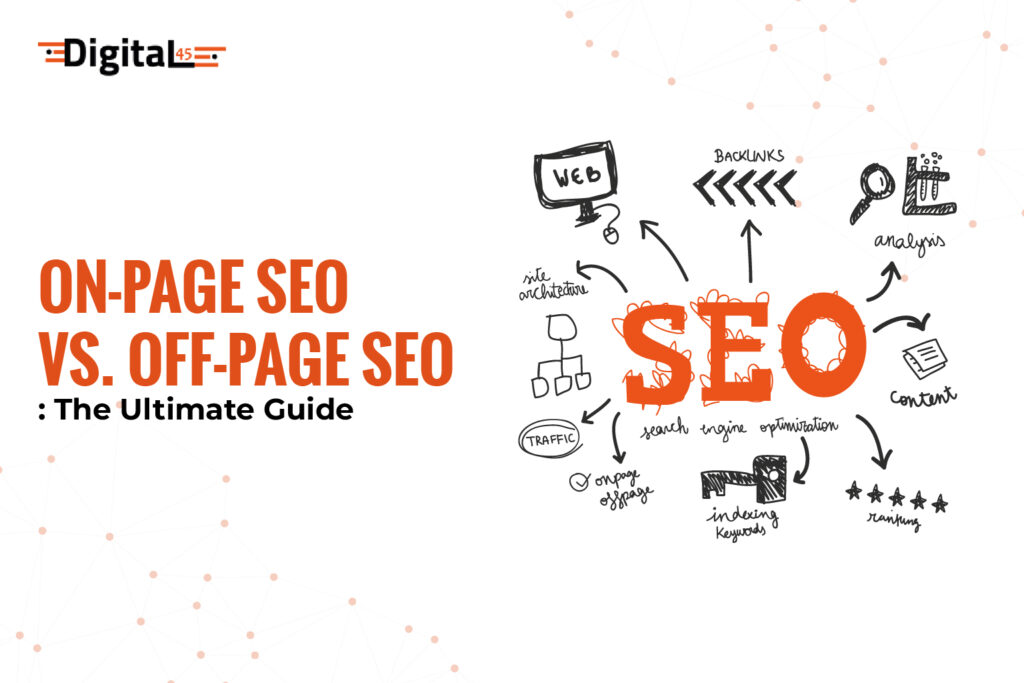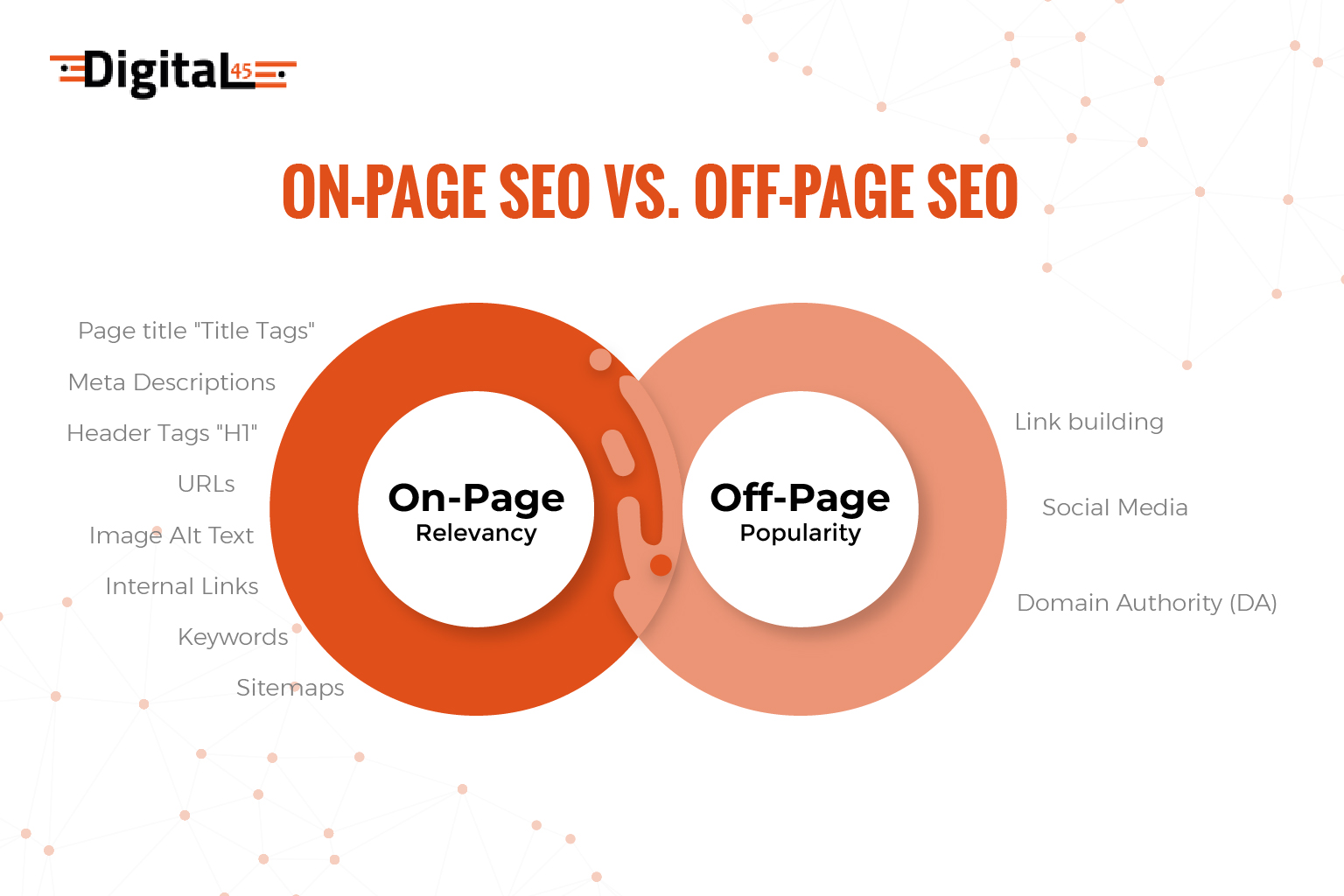In today’s digital landscape, having a strong online presence is essential for the success of any business or website. Search Engine Optimization (SEO) plays a crucial role in improving website rankings and attracting organic traffic from search engines. However, SEO is a complex field with various strategies and techniques, including On-Page SEO and Off-Page SEO.
You can take assistance from No 1 SEO company in Ahmedabad that can handle your off-page and on page both with the expertise.
In this comprehensive guide, we will delve into the differences between these two approaches and understand how they contribute to the overall SEO success of a website. So, let’s dive in and explore the world of On-Page SEO and Off-Page SEO.
I. Understanding On-Page SEO:
A. Definition and Components:
On-Page SEO refers to the optimization of individual web pages to improve their visibility and ranking in search engine results. It involves various components that help search engines understand your content better and provide a seamless user experience. Some key components of On-Page SEO include:
 Keyword Research: Conducting thorough keyword research is the first step towards effective On-Page SEO. This process involves identifying relevant keywords and phrases that users are likely to search for. By incorporating these keywords strategically into your content, meta tags, headings, and URLs, you can increase your chances of ranking higher in search engine results.
Keyword Research: Conducting thorough keyword research is the first step towards effective On-Page SEO. This process involves identifying relevant keywords and phrases that users are likely to search for. By incorporating these keywords strategically into your content, meta tags, headings, and URLs, you can increase your chances of ranking higher in search engine results.- Meta Tags: Meta tags are HTML elements that provide information about a web page to search engines. These tags include the title tag, meta description, and meta keywords. Optimizing meta tags with relevant keywords and compelling descriptions can influence click-through rates and improve your website’s visibility in search results.
- URL Structure: Creating SEO-friendly URLs is essential for both search engines and users. A well-structured URL that includes relevant keywords and is easy to understand can improve the user experience and make it easier for search engines to crawl and index your web pages.
- Content Optimization: Creating high-quality, informative, and engaging content is crucial for On-Page SEO. Optimizing your content with relevant keywords, headers, subheadings, and internal links can help search engines understand the context and relevance of your content. Additionally, providing a seamless user experience through well-structured content can improve your website’s ranking in search results.
B. Importance of On-Page Optimization:
On-Page SEO plays a significant role in improving the visibility and ranking of your website. By optimizing your web pages, you make it easier for search engines to understand your content and present it to users who are searching for relevant information. Additionally, On-Page SEO emphasizes the importance of user experience, which is a crucial ranking factor. When your website provides valuable content that satisfies user intent and offers a seamless browsing experience, search engines are more likely to prioritize your website in search results.
II. Mastering Off-Page SEO:
A. Definition and Tactics:
While On-Page SEO focuses on optimizing content within your website, Off-Page SEO refers to activities done outside your website to improve its rankings. Off-Page SEO primarily revolves around building authority and credibility by establishing a strong online presence. Some key tactics of Off-Page SEO include:
- Link Building Strategies: Building high-quality backlinks from reputable websites is one of the most important Off-Page SEO tactics. Backlinks act as “votes of confidence” for search engines, indicating that your website is trustworthy and relevant. Engaging in guest posting, influencer outreach, and creating shareable content can help you acquire valuable backlinks and improve your website’s authority.
- Social Media Engagement: Social media platforms provide an excellent opportunity to engage with your target audience, build brand awareness, and amplify your content. By sharing your content on social media and encouraging user engagement (likes, shares, comments), you can increase your website’s visibility and attract more organic traffic.
- Online Reputation Management: Monitoring and managing your online reputation is crucial for Off-Page SEO. Building a positive brand image, managing customer reviews and ratings, and responding to feedback can significantly impact your website’s credibility and search engine rankings.
B. Significance of Off-Page Optimization:
Off-Page SEO factors play a vital role in determining search engine trust and authority. By engaging in link building strategies, social media engagement, and online reputation management, you can build a strong off-site presence and establish your website as an authoritative source of information. Search engines consider these external factors when determining the quality and relevance of your website, ultimately influencing your rankings in search results. Additionally, Off-Page SEO efforts with the help of No 1 SEO company in Ahmedabad have long-term benefits, as building a strong online presence and reputation takes time and consistent effort.
III. Comparing On-Page and Off-Page SEO:
A. Differences in Focus:
On-Page SEO and Off-Page SEO have distinct focuses when it comes to optimizing your website for search engines.
- On-Page SEO primarily revolves around optimizing content, meta tags, URLs, and other elements within your control. It emphasizes providing valuable and user-friendly content that aligns with user intent and improves the overall user experience.
- Off-Page SEO, on the other hand, focuses on external factors beyond your immediate control. It involves building backlinks, engaging with your audience on social media, and managing your online reputation. Off-Page SEO aims to establish your website’s authority and credibility in the eyes of search engines.
B. Impact on Search Engine Rankings:
Both On-Page and Off-Page SEO play crucial roles in determining your website’s visibility and organic traffic from search engines.
- On-Page SEO ensures that your website is optimized for search engines to understand and index your content effectively. It helps search engines determine the relevance and quality of your web pages, ultimately impacting your rankings.
- Off-Page SEO factors, such as backlinks and social media engagement, contribute to search engine trust and authority. These factors validate the quality and relevance of your website in the eyes of search engines, influencing your rankings.
To achieve optimal results and improve your website’s rankings with the assistance of No 1 SEO company in Ahmedabad, it is crucial to adopt a balanced approach that combines both On-Page and Off-Page SEO strategies.
IV: Best Practices for Effective SEO Strategies
A: Combining On-Page and Off-Page Techniques:
To maximize the impact of your SEO efforts, it is essential to integrate both On-Page and Off-Page techniques. By combining these strategies, you can create a comprehensive SEO strategy that improves your website’s visibility, rankings, and organic traffic.
B: Key Factors for Success:
- Quality Content Creation and Optimization: Creating high-quality, informative, and engaging content is the foundation of successful SEO. You can improve your website’s visibility in search results by conducting thorough keyword research and optimizing your content with relevant keywords, headers, and internal links.
- Building High-Quality Backlinks from Reputable Sources: Using link-building strategies and acquiring high-quality backlinks from reputable websites can significantly boost your website’s authority and credibility. Focus on acquiring backlinks from relevant sources that align with your niche or industry.
- Social Media Engagement and Brand Building: Utilize social media platforms to engage with your target audience, share valuable content, and build brand awareness. Encourage user engagement and interactions to amplify the reach of your content and attract more organic traffic to your website.
- Monitoring and Improving Website Technical Performance: Regularly monitor and optimize your website’s technical performance, including page load speed, mobile responsiveness, and crawlability. Providing a seamless user experience is crucial for both On-Page and Off-Page SEO.
Conclusion:
In this ultimate guide to On-Page SEO vs. Off-Page SEO, we have explored the differences between these two approaches and understood their significance in improving website rankings. On-Page SEO focuses on optimizing individual web pages within your control, while Off-Page SEO emphasizes external factors that contribute to your website’s authority and credibility. To achieve optimal results, it is crucial to adopt a balanced approach that combines both On-Page and Off-Page SEO techniques. By creating high-quality content, building backlinks, engaging on social media, and optimizing your website’s technical performance, you can improve your website’s visibility, rankings, and organic traffic. So, Contact Digital45 and seek professional assistance from our trusted No 1 SEO Company in Ahmedabad; remember that effective On-Page and Off-Page SEO strategies are essential for the success of your website.



